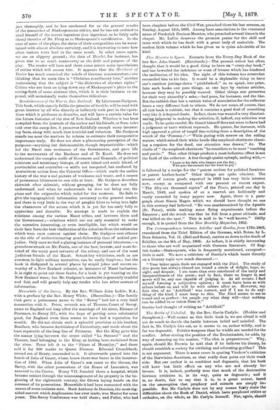Reminiscences of the War in New Zealand. By Lieutenant Gudgeon.
This book, which exactly fulfils the promise of its title, will be read with great interest by all who directly or indirectly took part in the opera- tions which it professes to describe, and will have a certain value for the future historian of the rise of New Zealand. Whether it has been compiled from the journals of the author and his friends, or from tales told over the camp-fire, it preserves faithfully enough many interest- ing facts, along with much that is trivial and valueless. Mr. Gudgeon stands too near the matters he relates to estimate their comparative importance truly. He does not show a glimmering perception of the purposes—anything but dishonourable, though impracticable—which led the Maori into resistance of the Government, and gave life to the movements of the Henbane and of Te Kooti. He does not understand the complex strife of Governors and Generals, of political ministers and missionary bishops, of north island and south island, of provincialist and centralist—a strife not tempered, but confused, by ntermittent action from the Colonial Office—which made the earlier history of the war a sad picture of weakness and waste, and a source of permanent bitterness on one side at least. Mr. Gudgeon describes skirmish after skirmish, without grouping, for he does not fully understand, and when he understands he does not bring out, the plans and the exigencies which ruled for the moment. He fails to give the topographical information necessary to the general reader, and there is very little in the way of graphic hints to bring into light the characters of the actors, which it is yet far too early fully to appreciate and describe. No attempt is made to explain the relations among the various Maori tribes, and between them and the Government ;—relations which are not only essential to make the narrative interesting, or even intelligible, but which would on their face form the best vindication of the colonists from the calumnies which were once current against them. Mr. Gudgeon errs oftener on the side of undiscriminating good-fellowship than of unkind pre- judice. Only once we find a glaring instance of personal bitterness,—a gratuitous attack on Mr. Parris, one of the best, bravest, and most de- voted of the many good servants of the colony, and one of the most judicious friends of the Maori. School-boy witticisms, such as are common in light military narratives, can be easily forgiven ; but the book is disfigured in several places by stupid jokes and sneers un- worthy of a New Zealand colonist, at instances of Maori barbarism. It is right to point out these faults, for a book is yet wanting on the Now Zealand wars; but Mr. Gudgeon's narrative- is generally truthful and fair, and will greatly help any reader who has other sources of information.


































 Previous page
Previous page